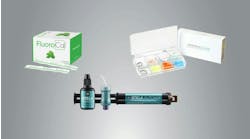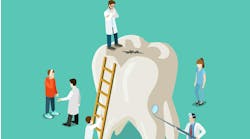By John A. Wilde, DDS
Reflecting on a career spanning 28 years from the clarified perspective created by retirement, I have to assert that, overall, dentistry has been very good to me. Despite being cursed with the eye-hand coordination of a clumsy three-toed sloth, I was able to achieve financial freedom by age 40 and fully retire at age 53. My occupation also afforded unending creative opportunities that were essential to my happiness. I did some things well and some poorly, but I was always free to do them "my way."
Despite these attainments, I suffer a number of lingering regrets. I'd like to share these concerns with those who still wear gloves—even on warm days—in hopes of stimulating your thoughts toward achieving a life and vocation of maximum fulfillment. Consider me dentistry's version of Charles Dickens, as my advice is offered in hopes of keeping the ghosts of remorse from your door.
Regret No. 1
My primary regret comes from choosing fairness over compassion. My greatest shortcoming in this regard occurred with my teammates. You can't be optimally happy in dentistry without enjoying maximum physical and emotional support from those you work with on a daily basis. I was aware of this requirement, and diligently strove to achieve this end. But in the final analysis, I fell painfully short. In situations where my teammates and I disagreed, I "won" too many petty battles. I failed to understand that I often had to choose between being right ... or being happy.
Many people have trouble grasping the central concept that defeating another (being right) seldom leads to joy. Steven Covey's great works include the principle of embracing only win-win solutions. Covey understands that beating someone creates antagonism, not victory or bliss. Nowhere is this concept more critical than when dealing with people you work with every day.
I wish I'd compromised more — even suffered minor defeats of my own will for the sake of team-building — said thanks more, done everything within my power (including enhancing pay and benefits) to express my gratitude for my teammates' support, and developed maximum staff loyalty.
I say this not only because I would liked to have been more compassionate or even more successful, but because I selfishly realize the happiest dentists are those who empower teams of co-workers who support, respect, even love them. Excellent dentistry is very difficult to achieve alone. Creating a cohesive group of people who enjoy each other and their work is a vital component of maximum success and joy.
Regret No. 2
Despite being a sensitive person, I also sometimes failed to show optimal compassion to patients, usually when I was under more pressure than I could comfortably endure. During most of my career, our practice cared for a minimum of 4,000 active patients. Under the stress of excessive patient demands, I sometimes lost sight of my guiding vision by allowing personal fatigue, plus time and money concerns, to become more important than people.
I was blessed because I never had to deal with a lack of patients. However, I'm sure the financial and emotional pressures resulting from not being busy could also lead to placing personal concerns above patient needs. Whatever the motivation, taking the "quick fix" of putting your own personal needs above the concerns of others is a sure prescription for unhappiness for everyone involved.
I wish I had worked harder to control the pace of my office, saying "no" when I couldn't accomplish more and still perform at my compassionate best. I often felt tired and stressed out, and lost my focus on the essential truth that I worked primarily for myself — to attain fulfillment, growth, and happiness in my life. This mind-set is not selfish. Only when these personally fulfilling goals were being achieved did I enjoy the energy that allowed me to optimally serve others. It was my obligation to create an ideal practice environment in which I could maximize opportunities for success and happiness. A perpetually stressed dentist benefits no one! When I allowed the pressures of my patients' demands to destroy the balance in my life, I hurt myself, my patients, my staff, and my loved ones. In retrospect, as a foundational principle, I would insist my office be continuously run not to maximize profit or efficiency, but in a manner consistent with my dreams and personal happiness. Everyone involved would be better served.
Regret No. 3
I scheduled 40 minutes for an adult new-patient examination. I wish I had expanded and enhanced these examination appointments, enabling me to invest more time enjoying and getting to know each patient. This would strengthen relationships, allow me to better assess each patient's ideal dental desires, and then offer the best care I was capable of delivering, consistent with personal oral-health care values my team and I conscientiously helped each patient clarify.
Late in my career, I grew to more completely understand human dynamics and learned the power of communicating through stories. Understanding the potency of anecdotes eliminates the generally futile and frustrating task of what dentists refer to as "formal case presentation." When a dentist understands his or her patient's values and desires, these factual exercises in misery can be replaced with brief stories that vividly illustrate the benefits to each patient of achieving his or her unique dental aspirations.
I developed narratives to help patients envision their oral-health dreams. I did this not to sell more dental care, but to more effectively allow patients to understand the wonderful opportunities modern dentistry offers to enhance the quality of their lives. Conflict with patients destroys joy. Dentistry is much more fun and rewarding when patients, staff, and dentist are all pursuing the same clearly defined and exciting goals.
Regret No. 4
As the oldest of five siblings — with a father who worked in a factory — I grew up enjoying few material blessings. Money was a constant topic of worry and a source of strife. For me, a portion of success had to include financial freedom. Yet, my final regret is that I didn't do more charity dentistry. I believe our practice did our fair share, actively recruiting pro-bono patients identified by church or welfare agencies as needy and without resources.
But I'm haunted by memories of patients who didn't complete even caries removal due to financial constraints, and then quietly disappeared from our practice. I believe I failed the very people among whom I was raised — the proud working poor — who would rather suffer than ask for help. For many years, I felt being just and honest was sufficient, but dentistry blessed me with a myriad of opportunities to aid people with pressing needs. I was often only fair when given opportunities to be gracious and generous. There is truth in the saying "to whom much is given, much is expected." I allowed money to become a barrier to delivering care that was greatly needed. I wish I'd done more.
I believe in the cosmic principle of cause and effect, sometimes referred to as Karma ... that what you sow does determine what you reap. My experience indicates that life is basically fair and that, over time, it returns to you what you send out. I'd send more love.
I urge you to examine your practice and determine if it functions in a manner consistent with your most deeply held beliefs and values. If it does, you're experiencing a lot of joy. If it doesn't, everyone involved feels the stress that occurs when behaviors aren't consistent with values.
If stress is your norm, I'd urge you to do whatever it takes to change. Carefully clarify your defining beliefs and values. Focus your life and your practice on these values, rather than on whether you win or lose or are right or wrong. There can be no success without happiness! Allow the presence or absence of bliss to guide your career and your life. You won't regret it!







